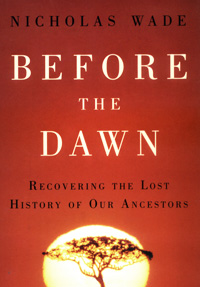Book Review: Before the Dawn
 Sunday, July 31, 2011 at 09:52PM
Sunday, July 31, 2011 at 09:52PM By John Michael
 The premise of the Paleo diet, that we should eat the foods we were designed to eat, is founded upon the ideas of evolutionary biology. But for many of us, the science of evolutionary biology is, if not a complete mystery, then only a vaguely understood concept.
The premise of the Paleo diet, that we should eat the foods we were designed to eat, is founded upon the ideas of evolutionary biology. But for many of us, the science of evolutionary biology is, if not a complete mystery, then only a vaguely understood concept.
In Before the Dawn, (2006) Nicholas Wade, a science writer for the New York Times, guides the reader through the history of human development, starting with the first hominids, and then continuing until the present day, with an interesting glance at evolutionary changes that have occurred in the human genome since the Neolithic, when humankind began to leave behind their hunter-gatherer life and took up a settled agricultural existence.
Why does this book matter to Paleo dieters? For one thing, the better informed we are of our evolutionary heritage, the easier it is for us to make the right decisions concerning our bodies, and this book covers the spectrum of human evolutionary history, from the development of the nose, to the appearance of the pair bond among couples.
Most importantly, Wade talks about what distinguished behaviorally modern humans, who appeared around 50,000 years ago by his count, from those hominids who came before them.
"The bringers of the new culture made personal ornaments, of materials such as punctured teeth, shells and ivory beads. They played bird-bone flutes. Their missile technology was much improved. They were avid hunters who could take down large and dangerous game. They buried their dead with rituals. They could support denser populations. They developed trade networks through which they obtained distant materials."
The distinction that Wade makes shows us how these ancient peoples might be models for modern life, and how they might not. The importance they attached to music, dancing, spirituality, and art, for example, could inform our own modern Paleo lifestyles, while their near universal practice of constant warfare would perhaps best be left in the past. Finally, in keeping with Paleoterran's mission, Before the Dawn offers knowledge of how the Earth formed us, which can foster a deeper sense within us of our connection to this planet, and so reveal yet again what should already be a common truth: that the health of this planet and our own are intimately connected, at such a depth that the welfare of one is indistinguishable from the welfare of the other.
 Anthroplogy,
Anthroplogy,  Nicholas Wade in
Nicholas Wade in  Books
Books 

Reader Comments